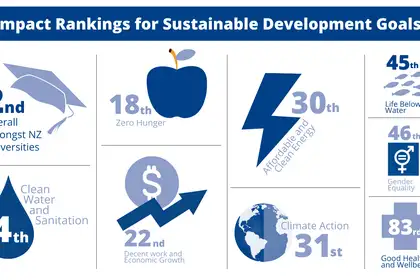
Massey University is ranked second overall among New Zealand universities in the latest Times Higher Education Impact Rankings.
Times Higher Education has released its 2021 Impact Rankings for Sustainable Development Goals (SDGs) – and it’s good news for Massey University, rising to second overall in Aotearoa New Zealand and 37th globally.
The Times Higher Education Impact Rankings measure global universities’ success in delivering the United Nations’ 17 Sustainable Development Goals.
The results, out today, show Massey is now 37th in the world across the 17 goals – 23 places up from last year, with standout successes coming in SDG6 – Clean Water and Sanitation – where it ranked fourth in the world for its research and education on water quality.
Massey also scored three number one placings within the New Zealand universities – for SDG2 Zero Hunger and SDG13 Climate Action, as well as for SDG6 Clean Water and Sanitation.
Massey – which launched Australasia’s first Master of Sustainable Development Goals in 2020 – is ranked number two in New Zealand, after the University of Auckland. These two are the only New Zealand universities ranked in the top 50.
Last year, Massey was one of 768 universities from 85 countries who participated in the Impact Rankings 2020. In this year’s Impact Rankings, Massey was one of 1,240 universities from 98 countries and regions across 18 tables – one for each of the United Nations’ 17 Sustainable Development Goals, plus one overall ranking.
Results for Massey University
| UN Sustainable Development Goal | 2021 Global Ranking |
|---|---|
| Overall | 37 |
| SDG1 – No Poverty | 61= |
| SDG2 – Zero Hunger | 18 |
| SDG3 – Good Health and Wellbeing | 83 |
| SDG4 – Quality Education | 201-300 |
| SDG5 – Gender Equality | 46= |
| SDG6 – Clean Water and Sanitation | 4 |
| SDG7 – Affordable and Clean Energy | 30 |
| SDG8 – Decent Work and Economic Growth | 22= |
| SDG9 – Industry, Innovation and Infrastructure | 101-200 |
| SDG10 – Reduced Inequalities | 101-200 |
| SDG11 – Sustainable Cities and Communities | 20= |
| SDG12 – Responsible Consumption and Production | 100 |
| SDG13 – Climate Action | 31 |
| SDG14 – Life Below Water | 45 |
| SDG15 – Life on Land | 77= |
| SDG16 – Peace, Justice and Strong Institutions | 101-200 |
| SDG17 – Partnership for the Goals | 33= |
Clean water
Among key contributors to Massey’s top ranking for Clean Water and Sanitation (SDG6) is Dr Ranvir Singh. Based at the School of Agriculture and Environment, he has been leading research as well as community and industry education on how to improve water quality across the landscape.
He and his colleagues, Dr Lucy Burkitt and Associate Professor Dave Horne, organised a free water quality workshop in February 2020, focused on sharing and advancing science and policy tools to help manage or mitigate water quality impacts from farming activities.
“The workshop had international (USA and Australian) and national speakers from universities, research organisations, consultants, primary industries and government,” he says. “It was attended by more than 50 participants including researchers, consultants, local farmers, water policy managers and advisors from primary industries, regional councils, government agencies and post-graduate students.”
The team also organised a demonstration of their Innovative Drainage Management technologies for researchers, consultants, local farmers, water policy managers/advisors from primary industries, regional councils, and post-graduate students.
Food issues
The university also scored well for SDG2 Zero Hunger, for a range of campus initiatives, such as the Massey University Students Association food grants for students, as well as support for local food rescue organisations Just Zilch and Kaibosh who regularly offer free food on campus for students. The Campus Co Lab project provided free fruit and vegetables to students on the Wellington campus, and free breakfasts and barbecues are offered on each campus by the Massey University Student Association.
The availability of sustainable food options and compostable food packaging on campuses, as well as workshops on sustainable agriculture for farmers and other industry stakeholders also lifted the results.
Massey’s Director – Sustainability, Dr Allanah Ryan says, “Massey’s recent improvement in the SDG rankings is testament to the integrated focus that the university has on sustainability-related issues. As a university we are very much focused on high quality research and education around the big challenges of our times.
“In addition we are working to improve the operation of our campuses and facilities, and join up our research and operationally focused efforts with our communities. An excellent example of this is Massey’s contribution to the Palmy Plastic Pollution Challenge which is a collaboration with Manawatū River Source to Sea, Massey Zero Waste Academy, Rangitāne o Manawatū and Palmerston North City Council.”
What are the Times Higher Education Impact Rankings?
The rankings are the only global performance tables that assess universities against the United Nations’ Sustainable Development Goals (SDGs). Results are based on carefully-calibrated indicators to provide comprehensive and balanced comparisons across four broad areas: research, stewardship, outreach and teaching.
Which SDGs are included?
There are 17 UN SDGs and Times Higher Education has evaluated university performance on all of them in their third edition of the ranking.
How is the overall ranking created?
A university’s final score in the overall table is calculated by combining its score in SDG 17 with its top three scores out of the remaining 16 SDGs. SDG 17 accounts for 22 per cent of the overall score, while the other SDGs each carry a weight of 26 per cent. This means that different universities are scored based on a different set of SDGs, depending on their focus.
Read more about the 2021 Times Higher Education rankings here.
Click here to find out more about the UN Sustainable Development Goals.